Influencer Gifting vs. Paid Collaborations: What to Know
Influencer gifting and paid collaborations seem identical at a glance. Spoilers: they’re not! This post explains the difference and tips for brands...
As the FTC updates its rules for influencers, brands have guidelines they must to stick to when gifting products. This post breaks down the rules on gifted content!
.jpg)
.jpg?width=1276&height=952&name=FTC%20cover%20(1).jpg)
Sending gifted products to influencers is a proven way to build brand awareness.
But running a gifting campaign DIY right means sticking to specific rules regarding disclosures.
The Federal Trade Commission regularly rolls out new regulations for influencers. Thing is, it's up to brands to keep creators in the loop.
For example, influencers who are new gifting campaigns might be wondering:
Trust us: you shouldn't assume that your creators know the rules of gifted content, either.
This is especially true as most gifting campaigns don't involve a formal contract. You don't want to accidentally ignore the FTC's rules, right? We didn't think so!
Below is a simplified breakdown of gifted post guidelines that brands need to know.
When creators are gifted products or partner with brands, these are the rules of thumb they have to stick to:
Although rules and platforms do change, sticking to these will help your creators stay on the right side of FTC guidelines. Not to mention brand safety.
Now, let's dig a bit deeper into these guidelines and disclosures that brands need to know!
Yes. Although gifted products are "free," disclosures are expected.
That's because the value attached to those "free" products counts as compensation. Disclosures are required whether you send products in exchange for reviews or exposure. According to the FTC:
“If you endorse a product through social media, your endorsement message should make it obvious when you have a relationship ‘material connection’ with the brand.”
Translation? In the eyes of the FTC, influencer gifting and paid collaborations aren't all that different. Both must be disclosed to followers in plain English.
The FTC's Endorsement Guide states that brands and influencers bear the responsibility of making disclosures happen.
Sure, you can't control word-for-word what an influencer says.
But you can stay compliant by setting the right expectations.
When in doubt, disclosures should be crystal clear. The FTC's advice is to make sure that people "see and understand" any disclosure.
There is no one-size-fits-all approach to disclosures. That said, "clearly" communicating a partnership typically involves influencers...
The idea here is simple: there should be no doubt as to whether a post is sponsored or not.
The good news is that gifted product posts don't have to be "salesy" or "boring." Check out our list of influencer gifting examples for inspiration.
Below is a list of sample hashtags and phrases that creators might use within their content to disclose a collab:
|
|
|
When an influencer promotes your gifted product, it’s up to you to establish guidelines with them.
This highlights a big benefit of using Statusphere and working with our creator network. Our influencers understand industry best practices and likewise have clear instructions to avoid any potential issues. Beyond that, our quality control process helps prevent FTC violations.
Again, skilled creators know how to play by the rules and show off your products in action.
Below are three best practices for gifted product posts according to the FTC. To help illustrate, we've coupled each rule with a real-life disclosure example.
Listen: hiding a partnership from your audience is a bad look.
If a business gifts a product with the expectation that an influencer will promote it, there needs to be a disclosure. The idea here is that audiences will view posts differently if they know there's a partnership.
Transparent disclosures mean that no one feels deceived. Trust us: honesty is the best policy.
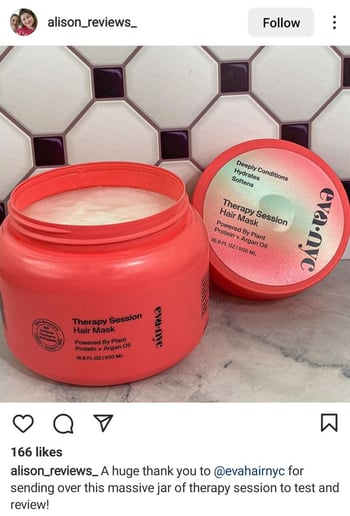
Source: @alison_reviews_
The FTC recommends avoiding abbreviated phrases like "spon” or "collab" (instead of "sponsored" or "collaboration"). This can be sort of a gray area but again, it's better to play it safe.
Instagram makes it simple to disclose gifted products with the platform's branded content tools. This includes the "Paid partnership" label you probably see all the time.

Source: @yoga_in_the_oaks
Still, these labels aren't the be-all, end-all of a compliant disclosure. Hashtags like #ad, #sponsored and #gifted should still be included in posts.
If you gift a product to an influencer in exchange for their own affiliate link, they must be clear about it. This is as simple as including something in a caption like: “FYI, I get a small percentage of the proceeds when you use my code!”
Being upfront about brand-influencer relationships helps your recommendations stay honest. Likewise, it makes the audience value the influencer’s words even more.
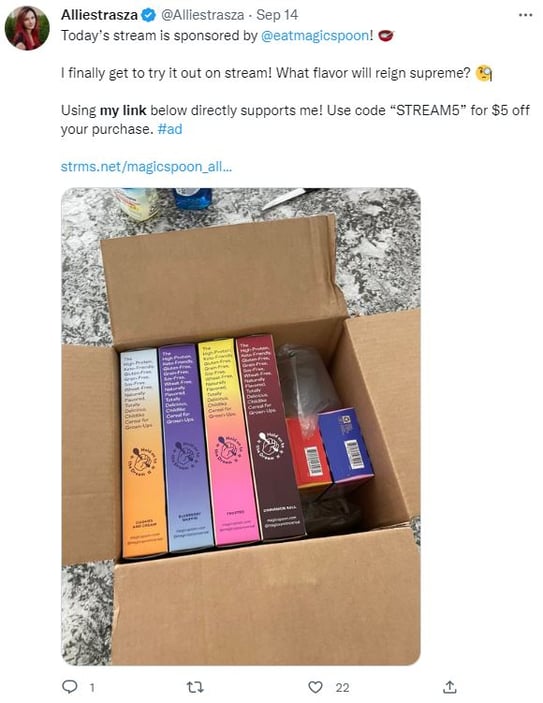
Source: @alliestrasza
Note: some of the following rules predate both TikTok and Instagram Reels.
In 2019, the FTC shared a "Disclosures 101" for influencers with guidelines for video content.
Summary? Disclosures should be made in both video and audio formats.
Viewers are more likely to acknowledge sponsored content when it's seen and heard. Through this sort of double disclosure, distinguishing gifted and organic posts should be straightforward.
Hiding the disclosure in a video description doesn’t cut it in this case. After all, some viewers may just watch the video without reading the description. This is especially true given the rise of TikTok and Reels.
The FTC also doesn't consider overlay text to be a proper disclosure. For example, you couldn't hide a microscopic "#ad" text in the corner of your video and be compliant.
In terms of sponsored content on YouTube, the platform is in line with the FTC. Disclosures should be present not only in a video's description but spoken and mentioned on-screen.
Thankfully, YouTube makes it easy for creators to disclose sponsorships. When uploading a video, you have the option to mark your content as promotional. Then, YouTube will feature a "Includes paid promotion" disclosure in the first ten seconds of your video. Check out the example below.
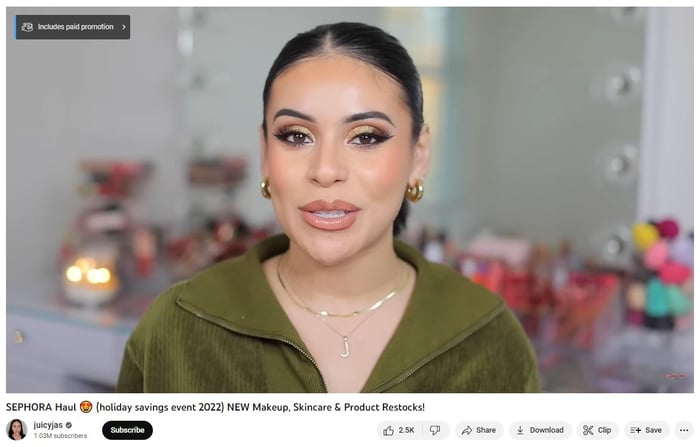
Source: YouTube
As you can see, this disclosure isn't distracting or in-your-face. Beyond the label, you'll notice that many YouTube creators will also disclose partnerships...

Source: YouTube
According to YouTube's paid promotion guidelines:
"Creators and brands are responsible for understanding and fully following legal obligations to disclose paid promotion in their content . . . "
Not really! The major social platforms adhere to the FTC’s guidelines.
Gifted posts are considered“branded content” on both Instagram and TikTok. As a result, these posts require the same disclosures we talked about earlier.
According to Instagram themselves, brands should “clearly” disclose gifted partnerships. Beyond a #gifted tag, many creators will mention that they were gifted a product in their video narration. TikTok's branded content policy is more or less the same.
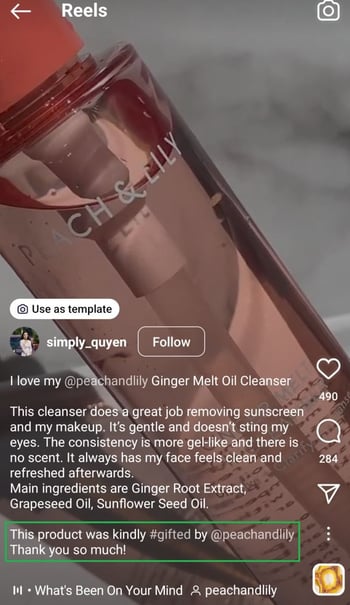
Source: @simply_quyen
The more influencer marketing grows, the more important it is for your brand to stay compliant.
Brands obviously want to avoid potential fines and legal trouble. Knowing these best practices protects your brand's reputation, simple as. You should ideally work with influencers who already understand these rules and stick to the best practices of the FTC.
And the more creators you partner with, the higher the stakes are.
If you need a scalable way to get more influencer content without second-guessing the rules or stressing about FTC guidelines, Statusphere can help.
Our micro-influencer software matches brands with vetted influencers from our creator community. Unlike other platforms, we guarantee a specific volume of content for our brands long-term. Our influencers likewise understand the best practices above.
Statusphere eliminates the most time-consuming pieces of working with influencers in-house thanks to our advanced matchmaking and fulfillment technology. We’ve already generated 75,000+ pieces of content for 400+ consumer brands.
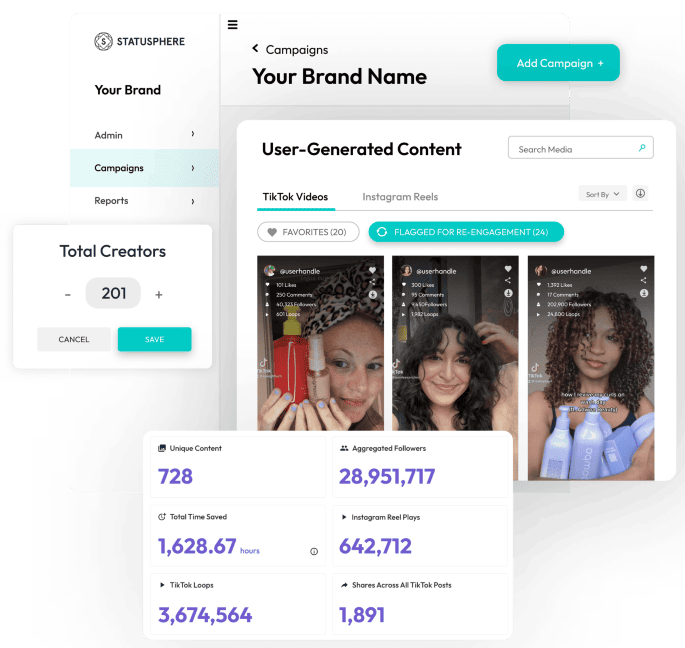
Want to see how our platform works? Get in touch with one of our experts to learn how we can optimize your brand’s marketing efforts with guaranteed content at scale.
Disclaimer: We're influencer marketing specialists, not lawyers ourselves! This content is not legal advice and you should definitely consult a legal professional based on your needs and questions. We do not make any guarantees as to the accuracy or completeness of this information and take no liability or legal obligations for your use of this information.
This article was first published in April 2020. It was last updated August 7, 2024.

Influencer gifting and paid collaborations seem identical at a glance. Spoilers: they’re not! This post explains the difference and tips for brands...
Done right, gifting products to influencers drives brand awareness and promotional UGC for brands. Here are nine influencer gifting examples to...
Getting UGC at scale with influencer gifting doesn't happen by accident. Below we break down how to fine-tune your influencer gifting strategy to see...
Be the first to know about the latest tools, trends and strategies in influencer marketing for brands.